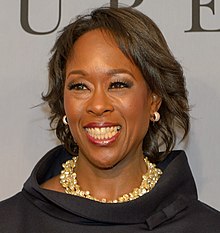Margot Lee Shetterly
Margot Lee Shetterly | |
|---|---|
 | |
| Born | 1969 Hampton, Virginia |
| Occupation | Writer |
| Nationality | American |
| Alma mater | University of Virginia |
| Genre | non-fiction |
| Notable awards | Sloan Fellowship, Virginia Foundation for the Humanities Fellow |
| Website | |
| www.margotleeshetterly.com | |
Margot Lee Shetterly (born 1969) is an American nonfiction writer. Her first book, Hidden Figures, has been made into a film, also called Hidden Figures (2016).[1]
Biography
Margot Lee Shetterly was born in Hampton, Virginia, in 1969. Her father worked as a research scientist at NASA-Langley Research Center,[2][3] and her mother was an English professor at Hampton University.[4] She attended Phoebus High School and graduated from the University of Virginia's McIntire School of Commerce.
After college, she moved to New York and worked several years in investment banking, first on the Foreign Exchange trading desk at J.P. Morgan, then on Merrill Lynch's Fixed Income Capital Markets desk. She then made the transition to the media industry, working at a variety of startup ventures including the HBO-funded website Volume.com.
In 2005, she and her husband, writer Aran Shetterly, moved to Mexico to found an English-language magazine called Inside Mexico,[5] for expats, which operated until 2009.
From 2010 through 2013, they worked as content marketing and editorial consultants to the Mexican tourism industry.
Shetterly began researching and writing Hidden Figures in 2010. In 2014, the rights to the book were sold to William Morrow, an imprint of HarperCollins, and optioned by Donna Gigliotti of Levantine Films.[6][7] The Fox 2000 film stars Taraji P. Henson, Octavia Spencer, Janelle Monáe, and Kevin Costner.
In 2013, she founded The Human Computers Project, an organization whose mission is to archive the work of all of the women who worked as computers and mathematicians in the early days of the National Advisory Committee for Aeronautics (NACA) and the National Aeronautics and Space Administration (NASA).[8]
Works
- Hidden Figures: The Story of the African-American Women Who Helped Win the Space Race, William Morrow/HarperCollins, 2016. ISBN 9780062363596.
- NASA-Langley Women's History Month 2014 Keynote: "Hidden Figures: The Female Mathematicians of NACA and NASA"
Reception
Shetterly is the recipient of a 2014 Book Grant from the Alfred P. Sloan Foundation[9] for her book Hidden Figures and two grants from the Virginia Foundation for the Humanities for her work on The Human Computers Project.[10]
References
- ^ Buckley, Cara (May 20, 2016). "Uncovering a Tale of Rocket Science, Race and the '60s". The New York Times. Retrieved July 13, 2016.
- ^ Epstein, Sonia. "NASA Mathematician Katherine Johnson Receives Presidential Medal". Sloan Science and Film. Retrieved July 13, 2016.
- ^ Mirk, Sarah (May 23, 2016). "In 'Hidden Figures,' NASA'S African American Mathematicians Wil Land on the Big Screen". Bitch Media. Retrieved July 13, 2016.
- ^ Atkinson, Joe. "From Computers to Leaders: Women at NASA Langley". NASA Langley. Retrieved July 13, 2016.
- ^ Johnson, Reed (February 14, 2007). "Speaking the Same Language". LA Times. Retrieved July 13, 2016.
- ^ Deahl, Rachel (March 10, 2014). "Book Deals: Week of March 10, 2014". Publishers Weekly. Retrieved July 14, 2016.
- ^ Fleming Jr., Mike (July 9, 2015). "Ted Melfi & Fox 2000 in Talks For 'Hidden Figures'; How A Group of Math-Savvy Black Women Helped NASA Win Space Race". Deadline. Retrieved July 13, 2016.
- ^ Atkinson, Joe. "From Computers to Leaders: Women at NASA Langley". NASA Langley. Retrieved July 13, 2016.
- ^ Epstein, Sonia. "NASA Mathematician Katherine Johnson Receives Presidential Medal". Sloan Science and Film. Retrieved July 13, 2016.
- ^ Bearinger, David. "The Human Computer Project". Virginia Foundation for the Humanitie. Retrieved July 13, 2016.
External links
- Margot Lee Shetterly website
- The Human Computer Project
- Hidden Figures HarperCollins site
- "Margot Lee Shetterly Wants To Tell More Black Stories". Interview by Ann Marie Cox, The Telegraph., 13 September 2016.
